Housing prices pit builders against banks

Faced with bottom-line competition from foreclosures and short sales, homebuilders in Las Vegas have reduced prices to the point that some are selling for less than $100 a square foot.
The average price of a new KB home at Manchester Park in the master-planned Providence community is $154,200, or about $80 a square foot, housing analyst Larry Murphy of Las Vegas-based SalesTraq said. That compares to the average foreclosure price of $149,746, or $84 a square foot.
The condition of a typical foreclosed home is probably less than desirable: dead lawn, filthy, trashed, possible structural damage, older neighborhood. The average age of a foreclosed home is 15.7 years, SalesTraq reported.
It was about 10 years ago that new-home prices in Las Vegas topped $100 a square foot and everybody was squawking about how the market had become more expensive than Phoenix, the most comparable city in the Southwest region.
The bursting of the housing “bubble” has brought prices back to those levels. Foreclosures, which account for two-thirds of home sales in Las Vegas, continue to put downward pressure on pricing.
“Foreclosures are definitely a part of the marketplace that we cannot ignore today,” said Jeremy Parness, sales agent for Lennar Homes.
One of the larger homebuilders in Las Vegas with 25 active communities, Lennar reduced prices on 60 homes in its standing inventory.
“We’ve got to do what we’ve got to do. We are very competitively priced with foreclosures,” Parness said.
Perhaps the biggest advantage of buying new is the 10-year warranty, he said. There are also builder incentives such as special financing rates, closing costs and payment protection plans similar to those being offered by automobile manufacturers.
Payment protection is essentially an insurance policy in which Lennar would pay the monthly mortgage for a period of time in case of job loss, Parness said. Like any insurance policy, there are qualification requirements and the loan must be with the Federal Housing Authority.
D.R. Horton dropped prices by about 50 percent across the board in January and was the No. 1 homebuilder in Las Vegas for the first quarter with 210 closings, Murphy reported.
“Apparently, that strategy is working,” he said.
Real estate consultant John Burns said housing affordability is at its best level in 38 years, while the economy is the worst in 50 years.
A number of factors — declining prices, low mortgage rates, higher incomes — have contributed to a 43 percent decline in the monthly cost of homeownership from its peak in this down cycle, he said.
A household with a median income of $52,800 a year needs to devote 25 percent of income to buy a median-priced single-family home at $164,600. In July 2006, that ratio was 44 percent.
“Those of us who are in the housing business know that the monthly payment is far more important than the price for entry-level buyers,” Burns said. “Entry-level buyers compare the cost of ownership to the cost of renting and have no idea what a Case-Shiller (home price) index means.”
Jim Widner, president of KB Home’s local operations, said his company is targeting entry-level buyers and renters with a May 9 seminar about the benefits of homeownership, including an $8,000 tax credit for first-time buyers.
“People make a big deal that the price of (owning) a home is cheaper than rent,” Widner said. “Shouldn’t it be? You save to put money down and you make a few sacrifices. Why shouldn’t it be cheaper than rent?”
KB has been able to bring the price of a 2,600-square-foot home at Manchester to $179,900, or about $67 a square foot, Widner said inside one of the model homes. Less demand for materials such as copper and lumber, combined with more available labor, has resulted in substantial savings, he said.
“You’re going to see a return to single-story. You’re seeing people get back to what do I need, instead of what can I have,” Widner said.
It’s true that a new home comes with a builder warranty, whereas a foreclosure is usually sold “as is” and offers nothing more than a low price, said Tim Kelly Kiernan, foreclosure specialist with Brodkin Group at ReMax Associates.
Still, value lies in the eyes of the beholder and when it comes down to price — often the determining factor — most buyers will go with the bank-owned property, he said.
“With the REO (real estate-owned) properties being priced so low and dominating the Las Vegas market, it’s difficult for a buyer to consider a new home,” Kiernan said. “The REOs are winning almost every time.”
Local homebuilders likely benefited from the recent foreclosure moratorium, Steve Hawks of Platinum Real Estate Professionals said.
“It created an artificial shortage of homes … and it gave the builders time to retool and price their homes below the banks,” he said. “Now there are instances where the banks are competing against the builders, another unintended consequence of an attempt at good intention. The builders are putting more inventory on the market and last I checked, that’s not good to soak up vacant homes.”
New-home permit activity has dwindled considerably in Las Vegas. SalesTraq reported 553 permits in the first quarter, down 48 percent from a year ago. Murphy projects fewer than 5,000 new homes will close escrow this year, less than half of the 2008 total.
A recovery in housing starts must be preceded by a meaningful uptick in sales, followed by a reduction in inventory, said Edward Sullivan, chief economist for Portland Cement Association. Those conditions won’t be in place until mid-2010, he said.
“Increased foreclosures, coupled with deteriorating labor markets and tight credit conditions, will delay significant sales activity until mid-2010,” Sullivan said. “Improvements in housing starts are not expected to be significant until 2011.”
Contact reporter Hubble Smith at hsmith@reviewjournal.com or 702-383-0491.